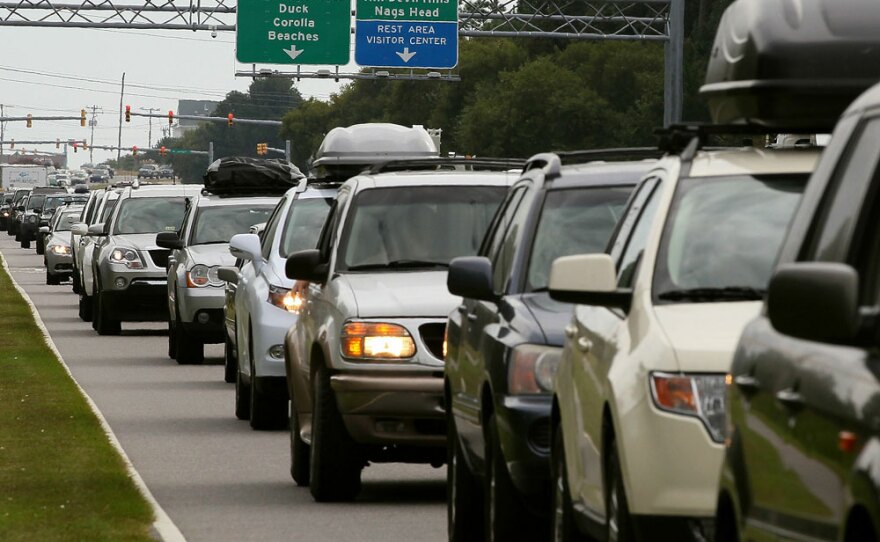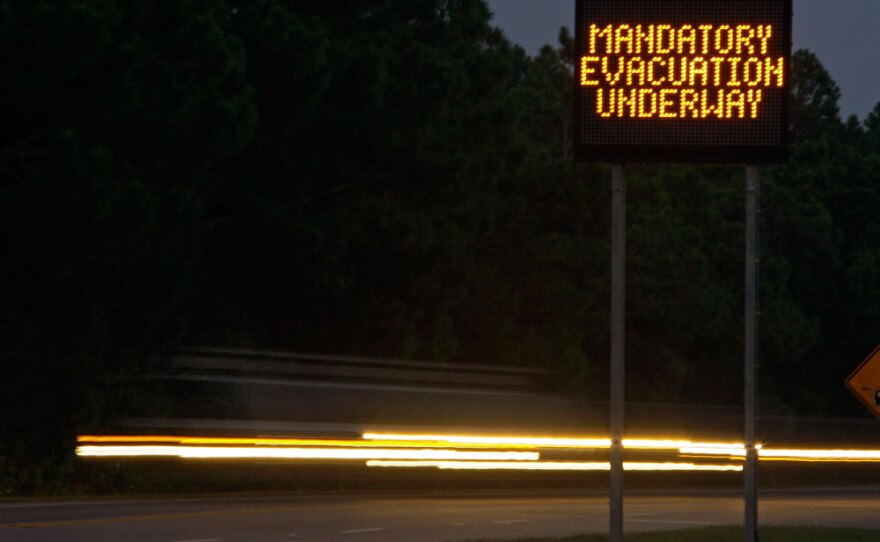
The last ferry left for the mainland and coastal residents hunkered down at home as Hurricane Earl closed in with 110 mph winds Thursday on North Carolina's dangerously exposed Outer Banks, the first and potentially most destructive stop on the storm's projected journey up the Eastern Seaboard.
The hurricane's outer squalls began to lash the long ribbon of barrier islands Thursday night. Gusts above 40 mph made signs shake and the heavy rain fall sideways in Buxton, the southeasternmost tip of the Outer Banks.
Hurricane Earl's winds were slowing, from 140 mph early Thursday to 105 mph, Category 2 strength, by 10 p.m. But forecasters warned that it remained powerful, with hurricane-force winds of 74 mph or more extending 70 miles from its center and tropical storm-force winds of at least 35 mph reaching more than 200 miles out.
National Weather Service meteorologist Hal Austin said the eye of the hurricane was expected to get as close as 55 miles east of the Outer Banks about 2 a.m. Friday. The coast is expected to be lashed by hurricane-force winds for a couple of hours with a storm surge of up to 5 feet and waves 18 feet high.
"It's spitting rain. It's probably going to get a little hairy. We're prepared for it. My biggest concern is the ocean, not the wind," said Karen Denson Miller, who decided to stay on Hatteras Island with friends.
Earl's arrival could mark the start of at least 24 hours of stormy, windy weather along the East Coast. During its march up the Atlantic, it could snarl travelers' Labor Day weekend plans and strike a second forceful blow to the vacation homes and cottages on Long Island, Nantucket Island and Cape Cod. A new tropical storm warning has been issued for New England from the coasts of Massachusetts to Maine.
Many vacationers were being forced to cut short beach trips to North Carolina's Outer Banks, packing up their cars and heading inland. About 30,000 residents and tourists have been ordered to leave Hatteras Island.
NPR's Jon Hamilton, at Nags Head, said nearly all of the tourists were gone by Thursday morning.
"Yesterday, the beaches here still had surfers and sunbathers, but today, there are no more in the water and only a few curious observers near the shore," Hamilton said.
He said that although the area is under a mandatory evacuation order, some residents were choosing to stay put -- "especially people with businesses."
"It's clear that people are pretty worried, though," he said. "A lot of people I've talked to mention a nor'easter last year that caused a lot of damage here, and that's what they are hoping doesn't happen again."
Retiree Tom Latouche, who lives a few lots back from the beach in Nags Head, was one of those who said he was staying.
"Pretty much your residents and property owners here are probably going to stay," he said. "You know, you like to be with your property in a situation like this. I'm not going to be stupid and I'm not going to risk my life, but I've been through this before and a lot of wind a lot of rain."
But Ken Muglia, the owner of the Nags Head Beach Inn, said he and other business owners were getting ready to leave the area as the storm approaches.
"The people south of us are leaving because they are under a mandatory evacuation, and the northern beaches are preparing to do that," he said.

Others seemed less concerned. North Carolinians are not unaccustomed to hurricanes, many of which have made landfall in the area in years past. Resident Nancy Scarborough, who manages the Hatteras Cabanas, said Outer Banks residents have a tightknit community that takes care of its own.
"I worry about not being able to get back here," she said. "I'd rather be stuck on this side than that side."
At Virginia Beach, Va., forecasters warned that rain and a 1- to 3-foot storm surge could bring flooding to low-lying areas. But plans for a weekend rock music festival there have not changed.
Kevin Skrobacki was one of about 50 surfers out hoping for big waves in advance of the stom. "It rips a little good, but picks up as the storm gets closer," Skrobacki said.
President Obama has declared a federal state of emergency in North Carolina, which authorizes the Department of Homeland Security and the Federal Emergency Management Agency, or FEMA, to coordinate evacuations and all other disaster relief operations. Governors in Massachusetts, Rhode Island, Virginia and Maryland have also declared emergencies.
As the storm moves farther north, it will remain extremely dangerous even as it is expected to lose a bit of strength, said Todd Kimberlain, a forecaster with the National Hurricane Center.
"It appears that Earl may have peaked in intensity," he said. "We expect from this point on, as it heads toward high latitudes, we will see a gradual weakening of the storm."
Earl's first encounter with the U.S. mainland should come around midnight Thursday, as the storm is forecast to pass just off Cape Hatteras, N.C., bringing wind gusts of up to 100 mph and several feet of storm surge from the Atlantic and the sounds to the west of the islands.
Farther up the East Coast, emergency officials urged people to have disaster plans and supplies ready and weighed whether to order evacuations as they watched the latest maps from the hurricane center -- namely, the "cone of uncertainty" showing the broad path the storm could take.
In Massachusetts, some boaters had already pulled their crafts from the water in anticipation of rough seas, said Harwich Assistant Harbor Master Heinz Proft. The Labor Day weekend is about the time of year when people start pulling their boats anyway, so some are just accelerating the process.
"It's been a small percentage so far, but we are encouraging people to be proactive," he said.
In Virginia, Gov. Bob McDonnell activated the National Guard and sent 200 troops to the Hampton Roads area on Chesapeake Bay. The area was not expected to get the brunt of Earl, but many remember the surprise fury of Isabel, which killed 33 people and caused $1.6 billion in damage in September 2003.
Tugboat captain Randy Francis planned to ride out the storm on his 40-foot trawler Invictus at a marina in Norfolk, Va. He said most people didn't appear to be taking the hurricane seriously.
"I was somewhat frustrated that they were somewhat nonchalant about it here," Francis said. "I'd just rather be safe than sorry."
Copyright 2022 NPR. To see more, visit https://www.npr.org. 9(MDAzMjM2NDYzMDEyMzc1Njk5NjAxNzY3OQ001))






